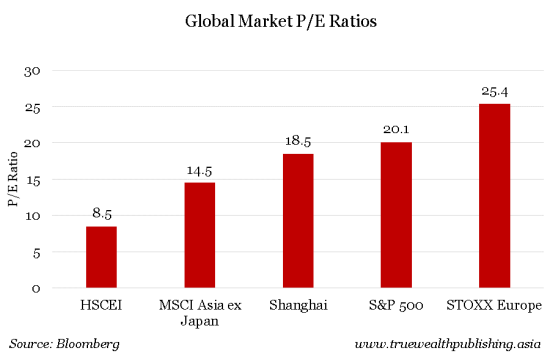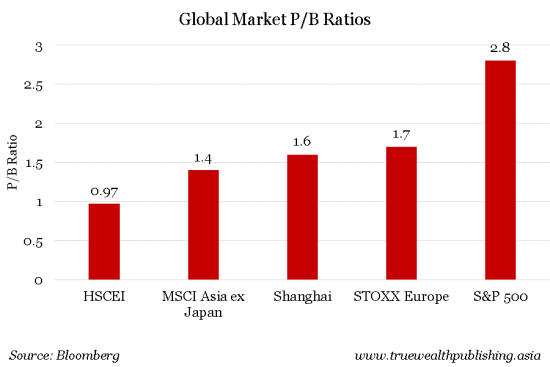This is one of the cheapest stock markets in the world

Imagine being able to buy shares for US$120 per share on one market and US$100 on a different exchange. Buying the cheaper shares of the same company would be a no-brainer for most investors. This is exactly what's happening with the shares of some of China's largest companies. They're trading for one price on the Shanghai or Shenzhen Exchange… but shares of the exact same company are trading at lower valuations on the Hong Kong Exchange. The shares that trade in Hong Kong are called H-shares… and they're one of the best-kept secrets in the investment world. They're the best value and opportunity to invest in China that we know of. What are H-shares?H-shares are the Hong Kong-listed shares of Chinese companies. They fall under the jurisdiction of Chinese law, but are denominated in Hong Kong dollars and are traded just like any other stock traded on the Hong Kong exchange. (They're kind of like American Depository Receipts (ADRs) traded on the New York Stock Exchange – which are the shares of non-U.S. companies, but they're traded just like a U.S.-based company on the NYSE.) H-shares allow mainland Chinese companies to gain access to Hong Kong's stock market, and foreign investors to buy the shares of Chinese companies. It's not uncommon for a large Chinese company to have both A-shares (shares that only trade on mainland exchanges) as well as H-shares. Two reasons why H-shares are attractive One way to value shares, and to assess whether they're cheap or expensive, is the P/E, or price-to-earnings, ratio. The P/E ratio is a quick way to know how much you're paying for one dollar of company earnings. The P/E ratio can also be calculated for an entire stock index. For instance, the current P/E for the S&P 500 is 20, which means you're paying $20 for every dollar earned by the companies that make up the index. There's an index for H-shares on the Hong Kong Exchange, too. It's called the Hang Seng China Enterprises Index (HSCEI). The P/E ratio for the HSCEI is 8.5. By comparison, the Shanghai Composite's – where A-shares trade – current P/E is 18.5. European stocks, as measured by the STOXX Europe 600 Index, have a P/E ratio of 25.4. And the rest of Asia, excluding Japan, has a P/E of 14.5. By this measure, Hong Kong's H-share market is much cheaper than mainland China's A-share market – and among the cheapest in the world.

But the P/E discount is only part of the story. Another way to value shares is to look at the price-to-book ratio. The price-to-book ratio, or P/B ratio, compares share prices to the value of everything a company owns after it's paid off its debts, also called the book value. A P/B ratio of 1 means that a company's share prices are equal to the cash available to shareholders if the company sold everything it owned and paid off all its debt. Between 2013 and 2015, the HSCEI averaged a P/B ratio of 1.2. But that's fallen to a P/B of 0.97. That's about 3 percent less than the cash you'd raise if you liquidated each company traded on the market. By comparison, the current P/B ratio for the Shanghai Composite is 1.6 – much higher than that of the H-share market. The U.S. S&P 500 has a P/B ratio of 2.8; Europe's is 1.7; and the rest of Asia (outside of Japan) has a P/B ratio of 1.4.

This means that by the P/B ratio, the H-share market in Hong Kong is one of the cheapest in the world. There's more to the story These are only two reasons why the H-share market should be on your radar. Very soon, we'll be showing you how to get the complete picture on the H-share market… including why H-shares are so much cheaper than A-shares, how to buy them, and what specific stocks you should think about adding to your portfolio right now. More details shortly.

Kim Iskyan

 Yahoo Finance
Yahoo Finance 
